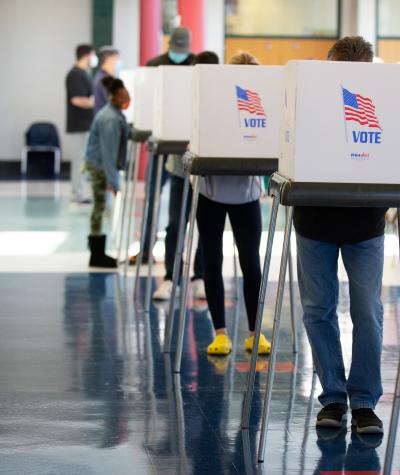Our democracy flourishes when all Americans can exercise their freedom to vote, no matter where they were born. Our elections are run locally, by members of our own communities, who work hard to make sure only U.S. citizens vote in federal elections. As a result of these efforts, voters can trust that our elections are safe, secure and accurate.
There are already strict laws in place that ensure only U.S. citizens can vote in federal elections. The safeguards we already have in place, including strict criminal punishment, financial penalties and possible deportation, ensure that only eligible citizens can register and vote. Every state already has safeguards in place to verify voter eligibility and keep our elections secure.
In practice, efforts to target and remove suspected non-U.S. citizens from voter rolls often prevent qualified U.S. citizens from voting. Voter registration purges, especially when conducted so close to an election, deny qualified American citizens their freedom to vote. In some cases, there is no way for citizens to know they’ve been removed or get back on the voter rolls before an election. That’s why federal law protects registered voters by placing limitations on states’ ability to conduct systematic voter list maintenance in the last 90 days preceding a federal election.
These aggressive voter purge procedures target and harm naturalized U.S. citizen voters, often resulting in eligible U.S. citizens being incorrectly prevented from voting or being forced to jump through additional hoops to exercise their freedom to vote not required of other voters. Oftentimes, these purge policies rely entirely on stale, outdated citizenship data and target eligible voters who then face additional voter registration burdens.
In the runup to the 2024 election, Campaign Legal Center (CLC) will be working to ensure U.S. citizens are not wrongfully removed from the rolls during this crucial election year.
We are closely monitoring several states, including Alabama, Arizona, Florida, Georgia, Ohio, Tennessee, Texas and Virginia to ensure that they comply with the law and do not unfairly purge voters from their rolls.
These policies often specifically target naturalized U.S. citizens — especially Latinos and Asian Americans — in violation of the Fourteenth Amendment.
For example, some states have attempted to use citizenship data maintained by their motor vehicle agencies to conduct voter list maintenance activities. However, this tends to be an ineffective — and actually harmful — approach because Departments of Motor Vehicles (DMVs) and other similar governmental databases are not designed to track current citizenship status for their customers.
In the scenario outlined above, a DMV may issue a license to a non-U.S. citizen who shows proof of lawful presence, but that person may naturalize as a citizen and lawfully register to vote long before their next interaction with the DMV.
Because the citizenship data tracked by these agencies is not current, these types of database matching practices are far more likely to result in eligible U.S. citizens being incorrectly flagged for removal from the voter registration rolls than they are to identify non-U.S. citizens who are registered to vote.
Years ago, when Texas tried this approach, it harmed tens of thousands of eligible Texas voters by wrongfully flagging them for removal and threatening them with civil and criminal penalties, despite the fact that they had done nothing wrong. Immigrants who have worked hard to become American citizens deserve the freedom to vote without facing unnecessary hurdles and harassment from the government.
At the end of the day, our democracy works best when every American can participate, so we need policies that protect the freedom to vote — not deprive voters of this basic American freedom.

